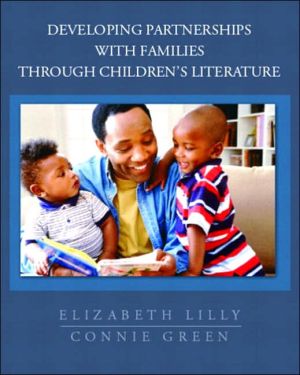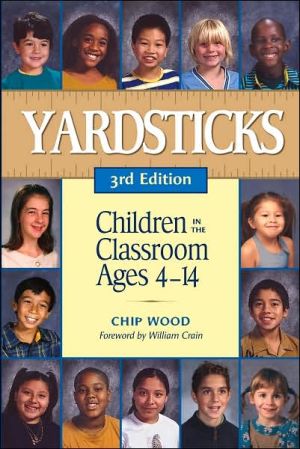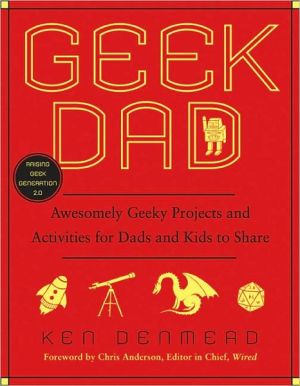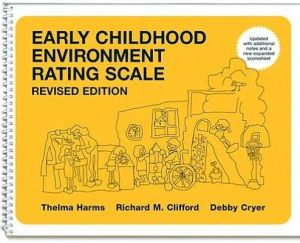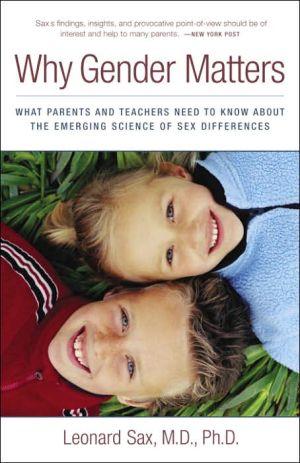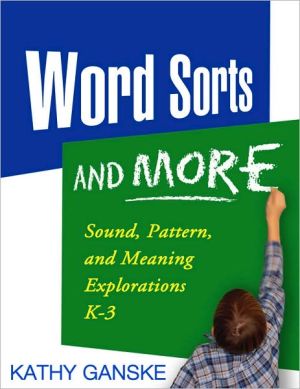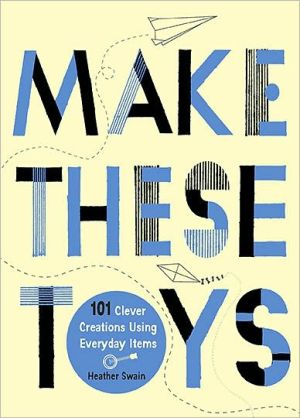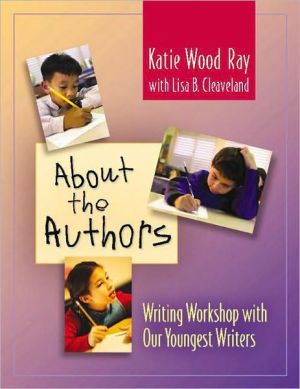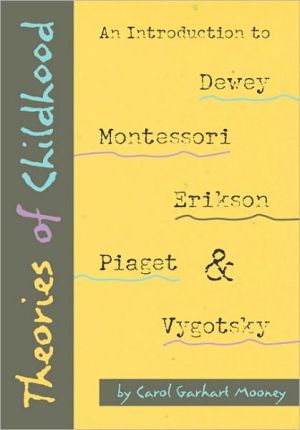Developing Partnerships with Families Through Children's Literature
This book blends information on contemporary families, research on early literacy, and practical strategies for sharing children's literature in classrooms, homes, and pre-school settings. Content is based on the belief that adult-child interactions around story-reading play a significant role in fostering and developing children's language and literacy skills. This role manifests itself differently according to the social, cultural, and linguistic environment of a child's home. The authors...
Search in google:
This book blends information on contemporary families, research on early literacy, and practical strategies for sharing children's literature in classrooms, homes, and pre-school settings. Content is based on the belief that adult-child interactions around story-reading play a significant role in fostering and developing children's language and literacy skills. This role manifests itself differently according to the social, cultural, and linguistic environment of a child's home. The authors present a selection of children's books from all genres and an array of field-tested ideas for developing early literacy. Authentic voices of teachers, children, and family members illustrate vivid descriptions of successful teacher-family partnerships and literacy strategies that work.FEATURES: Extensive lists of children's books—Coded by age range for easy selection, culturally-diverse titles are incorporated that sensitively portray children with exceptionalities. Supplies readers with a wealth of choices in fiction, nonfiction, poetry, biography, and picture books—provides a starting point for building a personal library to share with their children and families. Significant coverage of family life, including respectful, positive treatment of diversity in traditions, style, and structure—embedded in discussions in every chapter. Gives readers practical suggestions for promoting reading in daily families. Includes daily routines (bedtime, playtime, preparing meals), as well as transitions such the birth of a new child or a death in the family. A Literacy Partnership Cycle —Highlighted by numerous literacy strategies that promote family involvement. Gives readers a simple framework for engaging families in their children's early literacy development—describes effective literacy practices for collaborating with families at home and at childcare centers and preschools. Teacher to Teacher and Family to Family features—Throughout the book. Illuminates text content through the unique experiences of preschool teachers, kindergarten teachers, and other childcare specialists—address common concerns and challenges, and offer practical suggestions shown to be effective in translating theory into practice. Internet Resources sections—Highlighted within chapters wherever appropriate. Refer students to Web sites relevant to early literacy, family involvement, children's literature, and advocacy—are ideal for in-class discussions, assignments, or self-study.AUTHOR BIOS:Elizabeth Lilly, Ph.D., is an associate professor of Early Childhood and Literacy Education at Berry College. Her professional experience includes more than 20 years as a preschool, primary, and elementary teacher and teacher educator. Dr. Lilly was closely involved in the development, implementation, and evaluation of Georgia's Pre-K program. She has conducted workshops for teachers and authored publications on early literacy, family involvement, and children's literature. Her research has focused recently on story reading in linguistically and culturally diverse families.Connie Green, Ph.D., is a professor in the Reading and Birth through Kindergarten programs at Appalachian State University. For 20 years she has worked with both undergraduate and graduate teacher education programs and has conducted research on early reading and writing in both home and early childhood settings. A former kindergarten, elementary, and preschool teacher, she continues her work in early childhood settings. Her favorite times are spent sharing books and playing with her grandchildren and hiking in the beautiful Blue Ridge Mountains.
Developing Partnerships with Families Through Children's Literature is a unique book that combines our interests in family involvement, emergent literacy, and children's literature. It is designed for early childhood educators, students, librarians, family specialists, and early interventionists who work with children from birth through age 5. The text blends information on contemporary families, research on early literacy, and practical strategies and resources for sharing high-quality children's literature in homes as well as in child-care and preschool settings.\ Our nation has become rich with cultural and linguistic diversity as we have received newcomers from all over the world. In addition, contemporary life-styles are reflected in the changing composition of our families. Given these factors, how can teachers and child-care professionals adapt the family involvement curriculum to meet the needs and interests of all the families with whom they work?\ We recommend many approaches, including the use of children's books that represent a broad range of cultures and family structures, practical and interesting ways to collaborate with families, and stories of families and teachers that reflect the joys of sharing books with young children. Each chapter highlights families reading together, children's responses to books, and suggestions for family involvement in literacy experiences. Photographs of families and their children extend the content in personal ways. A variety of professional development activities and Internet resources are recommended. Information is woven throughout the text on culturally and linguistically diverse families, multicultural literature, and resources for supporting varied family structures. We have emphasized the pleasures of reading aloud, included numerous children's books available today, and suggested appealing strategies for exploring books to support early literacy development.\ Our experiences with young children and families, our own research, and the research of others have shaped our approach to early literacy and family involvement. We know that as children learn new concepts and language from books, they relate to characters and stories in affective ways. The highly personal and social context of families enhances the ways young children demonstrate their feelings about stories and their understanding of text. Building on this, we emphasize the affective nature of sharing stories with young children. Dramatizing stories, encouraging active play, engaging in related music and art experiences, and talking about books are valuable ways to support children's responses to literature.\ Chapter 1 describes the language and literacy development of young children, beginning at birth and continuing until the transition to early reading and writing. Major points in the chapter are illuminated by authentic examples of language development and responses to literature recorded by parents at home.\ Chapter 2 introduces readers to the exciting world of literature for infants, toddlers, preschoolers, and kindergartners. We define each genre and describe representative books. A wide variety of literature is included.\ Chapter 3 contains numerous ideas for establishing and maintaining collaborative literacy partnerships with families. We present a distinctive, useful model for family involvement. Suggestions for implementing the model are described throughout the chapter.\ Chapter 4 honors families from various cultural backgrounds. We discuss five major cultural groups within the United States and offer specific recommendations for involving families from each culture. Children's books from each culture are highlighted, and ways to share the books are suggested.\ Chapter 5 focuses on the many types of family configurations that make up society today. We discuss special considerations to help teachers and childcare professionals work with each type of family. Books that feature varied family structures are reviewed.\ Chapter 6 addresses some of the major transitions families may face. Readers will learn ways to assist families experiencing events such as the birth of a child, divorce, or moving, as well as those who are raising a child with special challenges. Books are presented to help individual children, families, or groups of children adjust to changes in their lives.\ Chapter 7 describes everyday routines and experiences in the lives of families with young children. We discuss morning and evening times, going to child care or preschool, enjoying the outdoors, and learning about neighborhoods and communities. Books are recommended that depict daily events in unique ways. We address differing affective experiences of families with young children and suggest ideas for enriching family routines and daily activities with language and literature.\ Developing Partnerships with Families Through Children's Literature is a celebration of children and families. We provide a treasure trove of literature and related strategies and offer personal stories about the irreplaceable comfort, knowledge, and enjoyment that come with sharing books. We hope teachers and child-care professionals will use this book as a starting point to develop their own creative approaches to involving families in literacy experiences with young children.
Ch. 1Early Literacy Development1Ch. 2Sharing the Magic of Children's Literature39Ch. 3Linking Home and School Literacies89Ch. 4Families of Many Cultures121Ch. 5All Types of Families151Ch. 6Family Transitions181Ch. 7Daily Lives in Families207Professional References245Children's References255Name Index275Subject Index283
